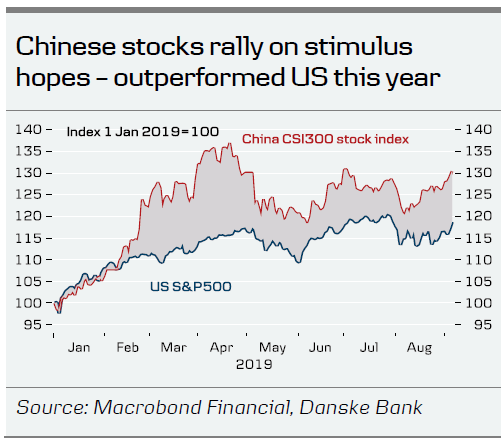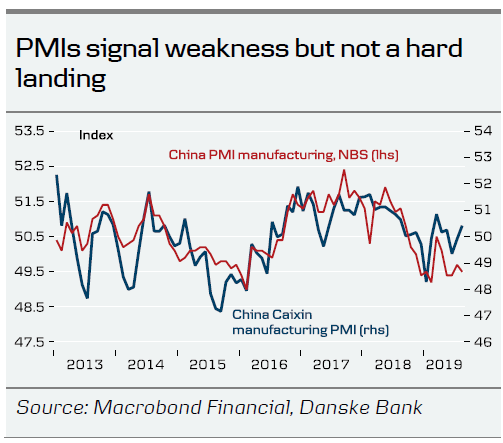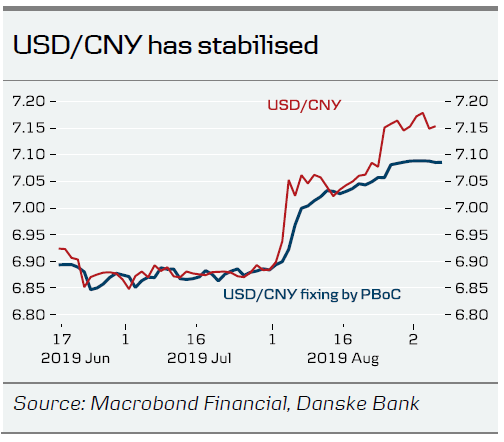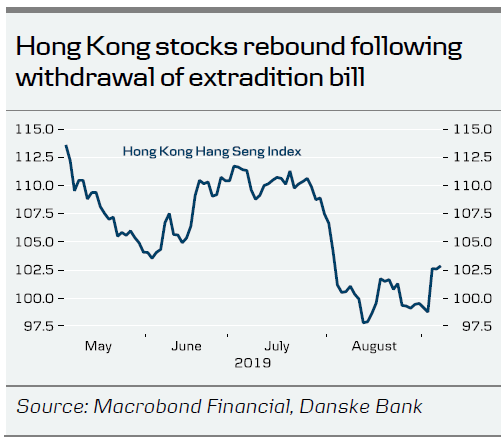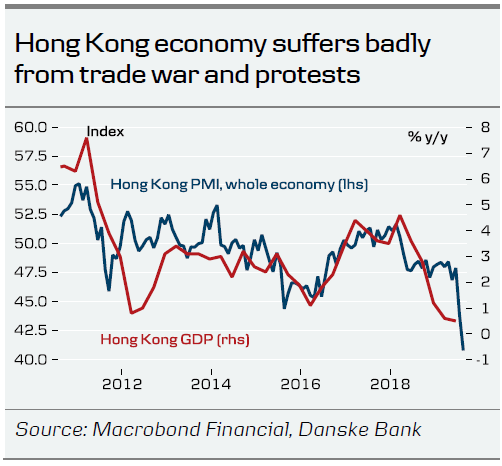- US-China trade talks are set to resume in Washington in October. While we do not see scope for a big breakthrough, it may put escalation fears in the background for now. The situation is still very fluid, though.
- Xi Jinping mentioned the word ‘struggle’ 60 times in a speech this week.
- China signals more stimulus is coming in order to keep growth within the 6.0-6.5% growth range. PMI data still signal weakness but no hard landing.
- USD/CNY is close to 7.20 but should take a break here as the People’s Bank of China signals it has gone far enough and trade war fears are abating for now.
- Hong Kong has withdrawn the extradition bill but it is still unclear whether this will stop the crisis.
Trade talks set to resume but very hard to break the deadlock
We finally got confirmation this week that the US and China will meet for new talks in Washington. They are set to take place in early October and not September as earlier planned. However, lower level officials will prepare for the meetings in September.
While there have been few signs of the two sides moving closer to a deal, there was a lift to sentiment following the news . A slightly more upbeat tone from insiders in China partly supported the positive mood. The Chinese Global Times state media, a more nationalistic and international version of People’s Daily , referred in an editorial to the message that both sides agreed to ‘ jointly take concrete actions to create favourable conditions for further consultations in October’ . A blog on Chinese social media called Taoran Notes said on Thursday that it is ‘very likely’ there will be ‘new developments’ in the upcoming trade talks. Taoran Notes is a blog by the state-owned Economic Daily , which is seen as a channel for communicating China’s stance in the trade talks.
On a less upbeat note, Chinese media reported that US company FedEx had illegally transported certain knives to Hong Kong. China has yet to put American companies on its ‘unreliable entities list’ but FedEx could be in danger of being among the first. The list is a direct response to the US ‘Entities List’, which blacklisted Huawei.
Comment: While we are sceptical about a decisive breakthrough at the October talks, the planned meetings are likely to put fears of new escalation in the background for a while. This is a supportive factor risk sentiment in the short term. One thing to look out for is whether the US carries out the tariff increase from 25% to 30% on USD250bn on 1 October. It is the 70-year anniversary day of the People’s Republic of China. If China can convince the US to at least delay the increase, it would be positive for financial markets. China may also wait to put US companies on its ‘unreliable entities list’ until after the talks in October in order not to stir things up. Our baseline is still no deal on this side of the US election in November 2020 (see US-China Trade – Three trade war scenarios – ‘no-deal’ now baseline , 8 August.
Xi Jinping mentions ‘struggle’ 60 times in speech
Chinese President Xi Jinping this week used the word ‘struggle’ 60 times in a speech summary published by Chinese state media. According to Xinhua Xi ‘warned of growing complexity of risks and tests which can be unthinkably challenging, stressed the long-term nature of various struggles and called for the courage to fight and the mettle to win’. The Chinese word for struggle is a bit more nuanced than what it seems and refers to the art of struggle and flexibility.
Comment: It is clear China is preparing for a journey of continued challenges on its path to fulfilling the ‘Chinese Dream’ in 2049, which entails becoming a prosperous country and with that the biggest economic power in the world, surpassing the US. Strengthening morale, standing up to external challenges and preparing the Chinese people for struggle have become centrepieces in Chinese communications this year. This suggests the leadership is laying the ground for a tough and drawn out trade war if necessary.
China signals more stimulus
This week China sent a clearer signal of new stimulus coming. The State Council stressed the need to ensure the economy grows within ‘a reasonable range’, which is likely to refer to the target range of GDP growth for this year of 6.0-6.5%. Both broad and targeted cuts in the Reserve Requirement Ratio for banks, as well as more funds to finance projects in the ‘real economy’, are on the table. The news follows stimulus messages from the National Development and Reform Commission of more measures coming to lift consumption. PMI data this week were on balance in line with expectations. The Caixin PMI manufacturing increased and is still at a fairly decent level but the NBS PMI manufacturing stayed close to the weak levels reached in previous months.
Comment: China continues to add stimulus drip by drip to keep growth at a minimum of 6%. China’s stimulus aims to underpin the structural rebalancing towards high-tech investments, private consumption and services while also using selective infrastructure projects to support demand. The leadership is careful not to do all-out stimulus though, as it would cause problems for the future. Data continues to signal weak growth but no hard landing. We believe further stimulus will serve to avoid a sharp slowdown.
USD/CNY climbs towards 7.20 but signs of stabilisation here
After USD/CNY climbed close to 7.20, the CNY has stabilised somewhat. The People’s Bank of China has kept the daily fixing at a stronger level below 7.10, which sends a pretty clear signal that China wants to keep a lid on USD/CNY around this level.
Comment: We expect the cross to stabilise in a 7.10-7.20 range. In the medium term, the direction depends on the trade war and how much the Fed cuts rates versus the People’s Bank of China. We expect USD/CNY to stay around 7.20 on a 3-6M horizon, as we expect the Fed to cut more than the People’s Bank of China and do not see a material further escalation of the trade war. To contain potential capital outflows, we believe China wants to stop the depreciation for now.
Hong Kong’s Carrie Lam withdraws extradition bill to stop crisis
After for a long time rejecting a withdrawal of the extradition bill that sparked the protests in Hong Kong, the bill was withdrawn this week. While this meets only one of the five demands made by protesters, it has been the most important trigger. However, it is too early to tell whether it is enough to turn the crisis. Some voices say it is ‘too little, too late’ but, at the same time, protesters might lose support from others in Hong Kong, as there is also a concern that the long drawn out protests will do irreversible damage to the economy.

